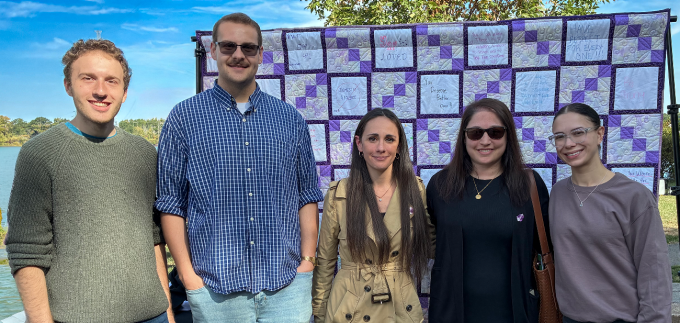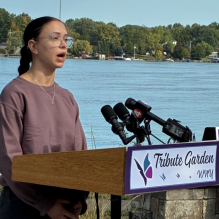
Left to right: Student attorneys Lennon Greco '26 and Skyler Rehbein '27; clinic alums Rachel Vicario '20, Assistant DV Bureau Chief and Gina Gramaglia '16, DV Bureau Chief at the Erie County District Attorney's Office; and student attorney Gaby Baker '26.
A year-round commitment to preventing domestic violence
October is Domestic Violence Awareness Month, but throughout the year, UB School of Law clinics continue to press ahead with work that both changes individual lives and helps to build a safer future for all.
Responding to immediate situations, clinic students represent and counsel individuals endangered within their households. But they also take the long view in fostering the conditions that prevent such violence in the first place.
Family Violence and Women’s Rights Clinic
Among the law school’s chief advocates for domestic violence prevention are the dozen students currently enrolled in the Family Violence and Women’s Rights Clinic. Clinical Professor Judith Olin '85, who directs the clinic, says the need for public education around the issue is ever-present.
“It’s important to remind people that this is still a serious problem,” Olin says. “Other serious crime rates have decreased, which is really great, but that hasn’t been the case, at least in our community, for domestic violence.” She says that in 2022 there were 15 homicides attributed to domestic violence in Erie County—more than in the entire New York City borough of Queens.
Register to attend
A Special Screening of Beyond Survival
Thursday, October 16, 2025
6 p.m. at UB’s Center for the Arts
[Details and Registration]
The problem is intertwined with the issue of gun safety, and the Family Violence and Women’s Rights Clinic has developed a presentation on New York State’s red flag laws, which empower police to remove guns from a household if a member is thought to be dangerous to himself or others. Clinic student Lennon Greco ’26 is planning to give this presentation to a group of community advocates this fall.
Citing the group Everytown for Gun Safety, Olin points out that the presence of a firearm in the home makes it five times more likely that a male abuser will kill a female partner, often in a murder-suicide. The presentation, she says, educates advocates on the differences between requesting such a removal through Family Court or through State Supreme Court.
“It’s important for domestic violence advocates to know about the red flag law procedure,” she says. “A lot of people don’t really understand what a red flag is and how it works. It can be an extremely quick way to get guns out of the house of a dangerous person.”

Gaby Baker ‘26 delivers remarks at the 10th anniversary of the Tribute Garden in Isle View Park in the City of Tonawanda.
Clinic students are reaching out in a couple of ways to spread the message of Domestic Violence Awareness Month. Third-year student Gaby Baker ‘26 spoke, along with Olin, at a ceremony marking the 10th anniversary of the Tribute Garden in Isle View Park in the City of Tonawanda, which honors those affected by domestic violence. And the clinic is working to have information about community resources displayed on UB Stadium’s video scoreboard during the Bulls’ Oct. 25 football game.
Those initiatives come in addition to other community outreach that clinic students undertake as well as the individual cases they take on as student attorneys.
Baker represents the clinic in the Family Offense Working Group, a consortium of advocates including the Family Justice Center and the Center for Elder Law and Justice. Building those relationships is important, she says, because advocates can help each other see gaps in the supports they offer to domestic violence victims and address systemic impediments to keeping victims safe.
For example, she says, one large local police jurisdiction requires that orders of protection be served only by certain detectives, not patrol officers, which may slow down the process, and adversely impact victims’ safety. Members of the working group are advocating for change in that policy to make the service more timely in situations where promptness can save lives.
Baker says working with her own clients has informed her community work as well. “It gives me a better understanding of how clients see things,” she says, “and that helps me to get at the broader issues. And when you’re working with an individual client, it’s good to know if there are elements of the system that can be problematic.”
Her classmate and fellow student attorney Kailyn Lane ’26 is working on early intervention, presenting to high school students and younger kids on how to prevent violence in teenage dating situations. It’s a presentation she delivered at Tapestry Charter School recently and to participants in Confident Girls Mentoring, an after-school program for younger girls.
“We talk about the long-term effects of dating violence, how abusers control victims, how to escape abusive relationships, advice on how they can help someone, and what a healthy relationship looks like,” Lane says. “We show them that just because something isn’t physical violence doesn’t mean it’s not dating violence.
“Some of the statistics are quite jarring,” she says: one in 11 teenage girls experience dating violence, and one in 15 teenage boys. “I want to think that the boys and the girls are listening equally,” she says, “and I just hope that it starts a conversation in places where these issues are not necessarily always talked about.”
Criminal Justice Advocacy Clinic
Another UB Law initiative comes through the Criminal Justice Advocacy Clinic, whose director is Associate Professor Alexandra Harrington. The clinic is co-sponsoring a showing of the one-hour documentary Beyond Survival, which tells the story of the Domestic Violence Survivors Justice Act. The New York State law, passed in 2019, was enacted to provide reduced sentences for survivors of domestic violence who are convicted of a crime for which the abuse they experienced was a significant contributing factor. It has shortened the prison terms for many women who became eligible for resentencing after the law’s passage.
The screening will be followed by a panel discussion including Harrington; Kim Dadou Brown, a survivor advocate; Monica Szlekovics, director of operations & programs for the Survivors Justice Project; and Kearra Bailey, a former clinic client who was resentenced under the DVSJA.
“The DVSJA is intended to acknowledge the role of trauma and domestic violence in criminal behavior and to offer courts the ability to take a full picture approach to sentencing,” says Harrington. “Since the Criminal Justice Advocacy Clinic was founded in 2020, the clinic has represented several DVSJA applicants and has secured resentencing for two clients, including Kearra, who are now home with their families.”
Beyond Survival will be shown Thursday, Oct. 16 at 6 p.m. in the Screening Room of UB’s Center for the Arts. [Register to Attend]